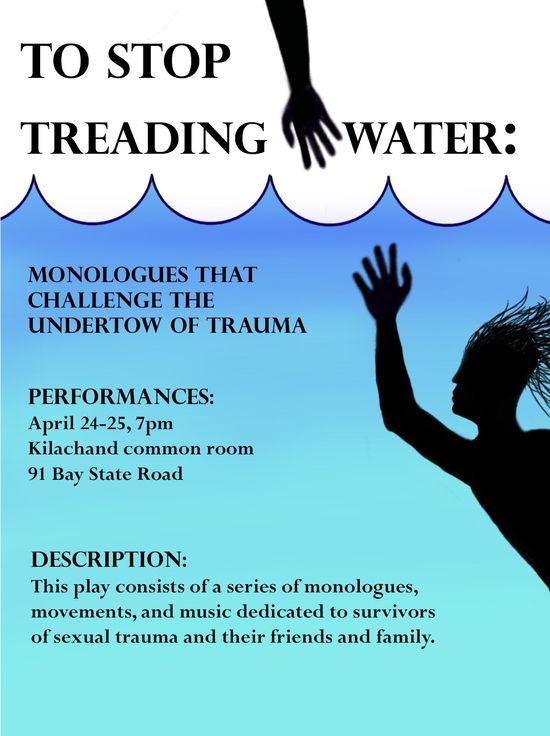A Performance at the Intersection of Theater and Activism
Kilachand Honors College student project invites discussion of sexual assault

Writer and director Nicole Rizzo (CAS’18) took inspiration for her senior thesis project from Eve Ensler’s The Vagina Monologues. Photos by Jackie Ricciardi
Nicole Rizzo’s play about sexual trauma inspired by Eve Ensler’s Vagina Monologues debuts tonight, and the timing is right. As the #MeToo movement exposes the breadth of sexual violence and harassment nationwide, To Stop Treading Water: Monologues That Challenge the Undertow of Trauma looks at how seven fictional university students cope with sexual violence.

The play was written and directed for Rizzo’s Kilachand Honors College senior thesis. The characters, who have come together at a reunion of subscribers to the feminist activist magazine F.I.S.H. (For Individuals Seeking Hope), explore their painful sexual experiences, which range from harassment to rape.
“It’s a very pervasive issue on a lot of college campuses,” Rizzo (CAS’18) says of the play’s subject. “I think it’s really important to have this conversation and learn about ways not to silence or shame people.”
Her characters include postgraduate River, who is trying to focus on her work, but is disabled by post-traumatic stress, senior Marisole, who struggles to make sense of an ugly sexual assault as a freshman, and Deniz, who was raped as a boy and retraumatized by things he witnesses in college, among them a male professor taking advantage of female students in his class.
Rizzo’s advisor, Carrie J. Preston, Kilachand Honors College director, says Rizzo has written a play that creatively melds dance, improvised string music, and choreographed movement.
“You can’t ignore the emotion in this play,” Preston says. “At the same time, it’s really funny, inspirational, silly. I think all that is so true to our lives. Whatever trauma might be present in our lives, we’re dealing with it through a strong community of supporters.”
The play doesn’t shy away from pain and soul searching: as part of her research, Rizzo interviewed eight survivors of sexual trauma, asking them to share their stories. She recruited them by putting out flyers around Boston and Cambridge asking for volunteers willing to speak anonymously.
“That’s the most important part for me,” Rizzo says. “People trusted me to share part of their story and let me use that so I can highlight some of the aftereffects of sexual trauma that no one’s really talking about.”
In Marisole’s monologue, she recalls how she was raped following a night of drinking at a fraternity party. “I went to the police, the Office of Judicial Affairs, the university authorities, UBPD, my friends, my family, my father, my mother, my sister, my brother, the local grocer, the post office, the baker, the local newspaper, and the fire department. I went to everyone I knew,” she says. “No one believed me.”
In another, her friend Deniz relates being retraumatized when a professor assaults him at a bar urinal. He suffers from depression and considers suicide, remembering being raped by 16-year-old soccer players when he was 10.
“I just felt frozen,” Deniz says. “The same thing happened when Professor G walked in on me using the urinal. Nobody thinks these kinds of things happen to boys. Sexual assault is a woman’s issue.”

Rizzo cast the roles herself and is directing the performances, which at one point bring all of the actors together to ask two questions in unison: “Why won’t anyone help me? Why doesn’t anyone believe me?”
An English major with a minor in women’s, gender, and sexuality studies, Rizzo says the inspiration for the piece came during sophomore year, after working on Preston’s 2016 play Zahdi Dates and Poppies, about a US Marine pilot who returns home traumatized from a tour of duty in Iraq.
Live theater, she says, can be a powerful way to take some of the discussion fueled by the #MeToo movement off-line and encourage people to talk about it. Rizzo also recruited actors from BU’s Shakespeare Society and Wandering Minds and among her classmates. All the actors will wear varying shades of blue as they speak and dance in carefully interwoven arrangements.
Rizzo, who is developing a website with materials to further the discussion of sexual trauma and its implications, says she will also offer audience members an information packet with supporting materials.
“Nicole is driven by a desire to make change, to change the feeling around sexuality on college campuses,” Preston says. “There’s just a tremendous amount of damaging sex taking place amongst young people on college campuses today.”
Rizzo would like to see her show performed widely, at colleges and universities around the United States. “This has been stuff that’s been on my mind,” she says. “It shouldn’t be on survivors to end rape culture. It’s on society in general.”
To Stop Treading Water: Monologues That Challenge the Undertow of Trauma will be performed Tuesday, April 24, and Wednesday, 25, at 7 pm, in the Kilachand Common Room, 91 Bay State Rd. Admission is free.
Comments & Discussion
Boston University moderates comments to facilitate an informed, substantive, civil conversation. Abusive, profane, self-promotional, misleading, incoherent or off-topic comments will be rejected. Moderators are staffed during regular business hours (EST) and can only accept comments written in English. Statistics or facts must include a citation or a link to the citation.